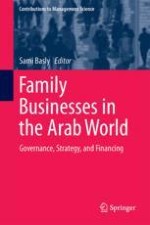2017 | OriginalPaper | Chapter
Moroccan Family Businesses: Specific Attributes, Logics of Action and Organizational Learning Dynamics
Author : Sara Bentebbaa
Published in: Family Businesses in the Arab World
Publisher: Springer International Publishing
Activate our intelligent search to find suitable subject content or patents.
Select sections of text to find matching patents with Artificial Intelligence. powered by
Select sections of text to find additional relevant content using AI-assisted search. powered by
